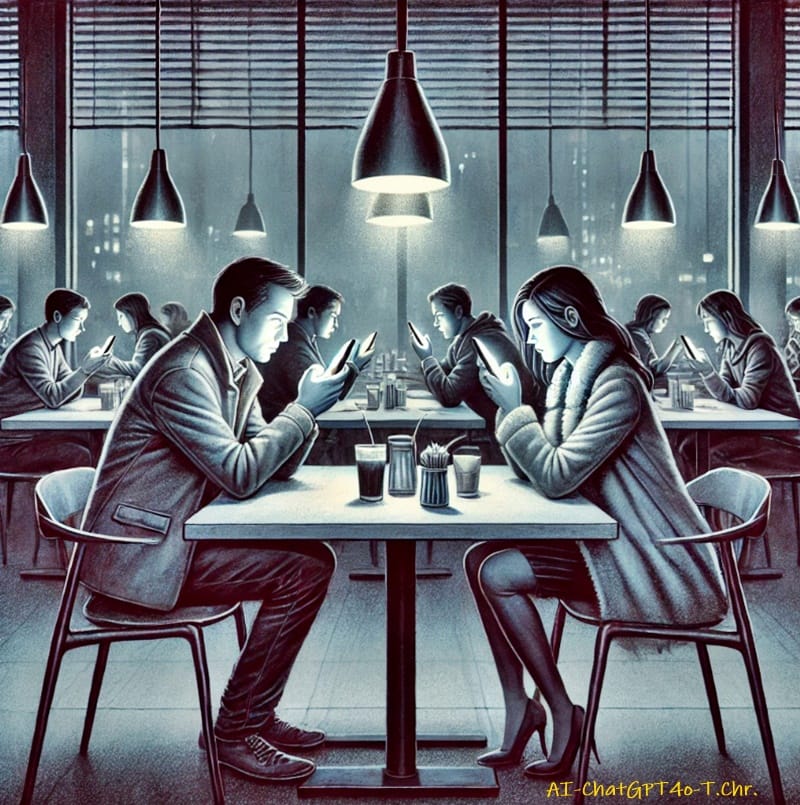MOBILE-EVOLUTION OR DEVOLUTION?

By AI-ChatGPT4o- T.Chr. - Human Synthesis - 16 November 2024.
Your mobile reflects a profound transformation in how humans relate to one another and the world. It reveals a shift in focus from immediate presence to virtual distraction, where the tools meant to connect us often isolate us instead.
This paradox lies at the heart of modern existence: we are more accessible than ever but increasingly unavailable in meaningful ways. In this landscape, the erosion of casual, everyday interactions signals a loss of something fundamental. Public spaces, once arenas for shared experience and spontaneous exchange, feel hollow when inhabited by individuals absorbed elsewhere.
The avoidance of eye contact, the failure to respond to simple gestures or remarks, creates an atmosphere of disconnection. It’s as if the collective rhythm of human engagement has been replaced by a fragmented, individualistic beat.
This shift carries moral weight. To acknowledge another person, even in passing, is a small act of recognition that affirms our shared humanity. The refusal to engage, whether through distraction or indifference, undermines this basic social contract. It creates a world where people are physically present but emotionally absent, a ghostly existence that leaves both the observer and the observed feeling unseen.
At the same time, this transformation offers an opportunity for reflection. The dissonance between the promise of connection and the reality of isolation invites us to reconsider our relationship with technology. Rather than allowing it to dominate our attention, we might reclaim our agency, using it as a tool to enhance rather than replace genuine interaction.
What emerges is a choice: to surrender to the drift toward disconnection or to actively cultivate presence and engagement. This is not simply a question of resisting technology but of reasserting the value of being truly here, with others, in the moment. It’s a call to rediscover what it means to belong—not to a network or a platform, but to the shared human experience that anchors us to one another.
This vignette captures the quiet tragedy of modern intimacy: proximity without connection, presence without attention. The scene in the restaurant, the couple at home—these are not isolated moments but symptomatic of a broader dislocation, where the tools of communication have become barriers to genuine interaction.
In the restaurant, two people sharing a table yet inhabiting separate worlds underscores a profound irony. The mobile, meant to bridge distances, creates one instead. The ritual of dining together, once a space for conversation and communion, becomes a stage for silence, where the glow of screens replaces the warmth of shared stories.
At home, the fragmentation continues. One absorbed in endless scrolling, the other lost in a solitary narrative on the screen. The question, "How was your day?"—a simple yet profound invitation to connect—goes unanswered or unheard, drowned out by the pull of digital distraction. This is the erosion of the ordinary, those small moments that bind relationships and weave the fabric of shared life.
What lies beneath this phenomenon is not mere negligence but perhaps a deeper discomfort. Real conversations demand attention, vulnerability, and sometimes confrontation with the complexities of another person. The mobile offers an escape: a curated world of control, far easier to navigate than the unpredictable terrain of human interaction.
Yet, the cost of this escape is steep. The missed "How was your day?" is not just a neglected question; it is a missed opportunity to affirm care, to anchor relationships in mutual presence. Each unspoken word, each unacknowledged glance, builds the distance further.
To reclaim these moments does not require grand gestures but a conscious effort to prioritize presence over distraction. The art of paying attention—undivided, sincere, and patient—might be the antidote to this quiet drift apart. It begins with small acts: putting down the phone, looking up, asking again, “How was your day?”—and really listening this time.
